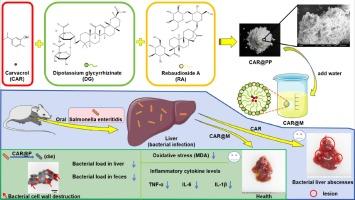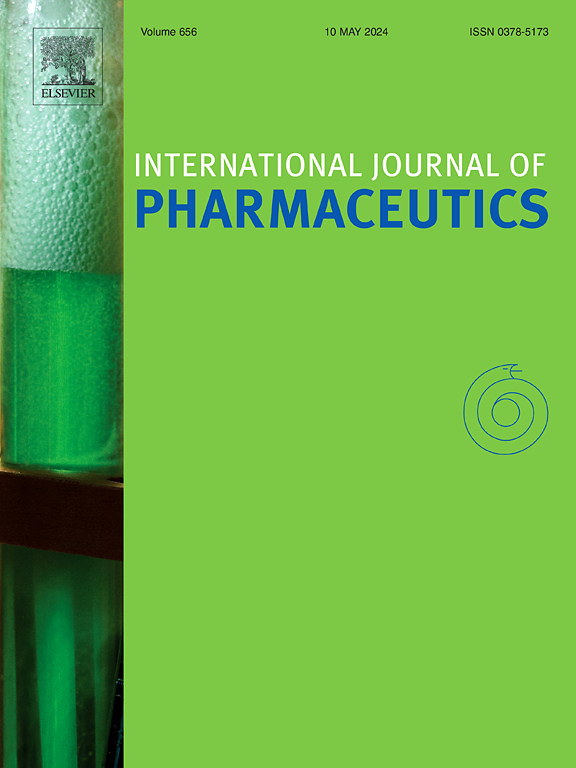Preparation, in vitro and in vivo assessment of novel carvacrol@pro-phytomicelles for the treatment of Salmonella enteritidis infection in mice
IF 5.3
2区 医学
Q1 PHARMACOLOGY & PHARMACY
引用次数: 0
Abstract
In livestock and poultry farming, the use of antibiotics has been abused, which seriously endangers human health. Thus, antibiotic alternatives are urgently needed. The phytochemical carvacrol (CAR) has attracted attention as an antibiotic alternative due to its excellent antibacterial activity and anti-inflammatory activity. However, CAR has high volatility and low water solubility, which seriously affect its antibacterial activity. In this study, two plant-derived small-molecule phytochemicals—glycyrrhizin and rebaudioside A—were selected as nanocarriers for the preparation of a novel solid pro-phytomicelle formulation named as CAR@PP. Using a simple fabrication method, the encapsulation efficiency of CAR reached 98.74 ± 1.14 %. CAR@PP was found to rapidly dissolve in water, resulting in a transparent solution (named as CAR@M) and a 59-fold increase in solubility compared to CAR. CAR@M contained uniform nanoparticles with a particle size, polydispersity index, and zeta potential of 3.52 ± 0.93 nm, 0.17 ± 0.01, and −10.63 ± 0.45 mV, respectively. The in vitro antibacterial activity of CAR@M was evaluated, and the minimum inhibitory concentration for the tested strains was 125–250 μg/ml. The antibacterial mechanisms were found that CAR@M disrupted the bacterial wall and biomembranes and efficiently inhibited bacterial biofilm growth. To the in vivo activity evaluation, treatment with 50 mg/kg CAR@M could effectively improve bacterial liver abscesses, decrease the inflammatory cytokine levels in the liver and cecum, and reduce the bacterial load in the liver and feces in Salmonella enteritidis-infected mice. In conclusion, CAR@PP is a promising alternative to antibiotics in livestock and poultry farming warranting further research.

用于治疗小鼠肠炎沙门氏菌感染的新型香芹酚@原植物霉素的制备、体外和体内评估。
在畜禽养殖业中,抗生素的滥用严重危害人类健康。因此,迫切需要抗生素替代品。植物化学物质香芹酚(CAR)因其卓越的抗菌活性和消炎活性,作为抗生素替代品备受关注。然而,香芹酚具有高挥发性和低水溶性,这严重影响了其抗菌活性。本研究选择了两种源自植物的小分子植物化学物质--甘草酸苷和雷公藤甙 A--作为纳米载体,制备了一种名为 CAR@PP 的新型固态原植物胶束制剂。通过简单的制备方法,CAR 的封装效率达到 98.74 ± 1.14 %。研究发现,CAR@PP 能迅速溶解于水,形成透明溶液(命名为 CAR@M),溶解度比 CAR 提高了 59 倍。CAR@M 含有均匀的纳米颗粒,其粒径、多分散指数和 zeta 电位分别为 3.52 ± 0.93 nm、0.17 ± 0.01 和 -10.63 ± 0.45 mV。对 CAR@M 的体外抗菌活性进行了评估,发现其对受试菌株的最小抑菌浓度为 125-250 μg/ml。抗菌机理表明,CAR@M 能破坏细菌壁和生物膜,有效抑制细菌生物膜的生长。在体内活性评价中,50 mg/kg CAR@M 可有效改善细菌性肝脓肿,降低肝脏和盲肠中的炎性细胞因子水平,减少肠炎沙门氏菌感染小鼠肝脏和粪便中的细菌量。总之,CAR@PP 是畜禽养殖中抗生素的一种有前途的替代品,值得进一步研究。
本文章由计算机程序翻译,如有差异,请以英文原文为准。
求助全文
约1分钟内获得全文
求助全文
来源期刊
CiteScore
10.70
自引率
8.60%
发文量
951
审稿时长
72 days
期刊介绍:
The International Journal of Pharmaceutics is the third most cited journal in the "Pharmacy & Pharmacology" category out of 366 journals, being the true home for pharmaceutical scientists concerned with the physical, chemical and biological properties of devices and delivery systems for drugs, vaccines and biologicals, including their design, manufacture and evaluation. This includes evaluation of the properties of drugs, excipients such as surfactants and polymers and novel materials. The journal has special sections on pharmaceutical nanotechnology and personalized medicines, and publishes research papers, reviews, commentaries and letters to the editor as well as special issues.

 求助内容:
求助内容: 应助结果提醒方式:
应助结果提醒方式:


